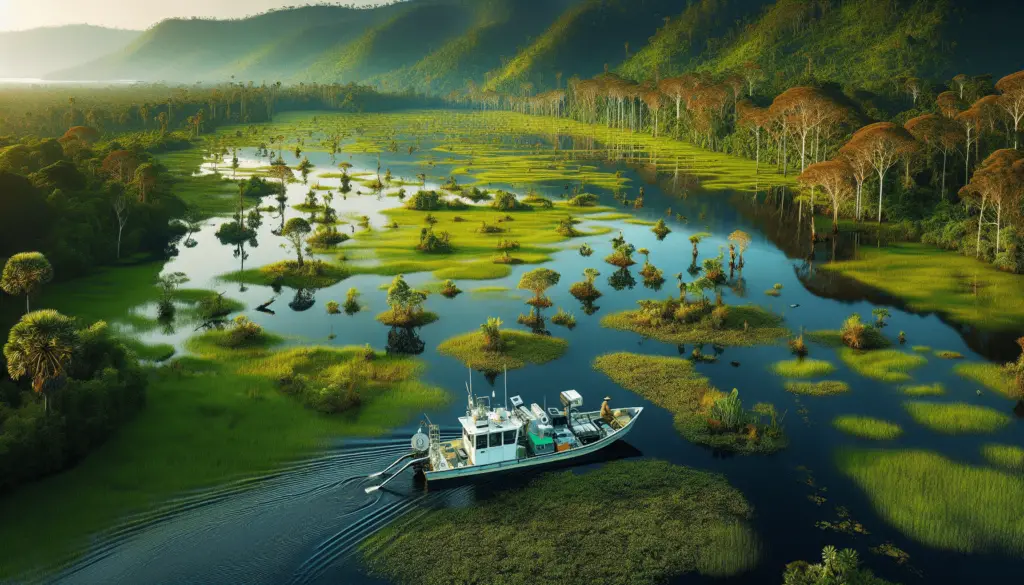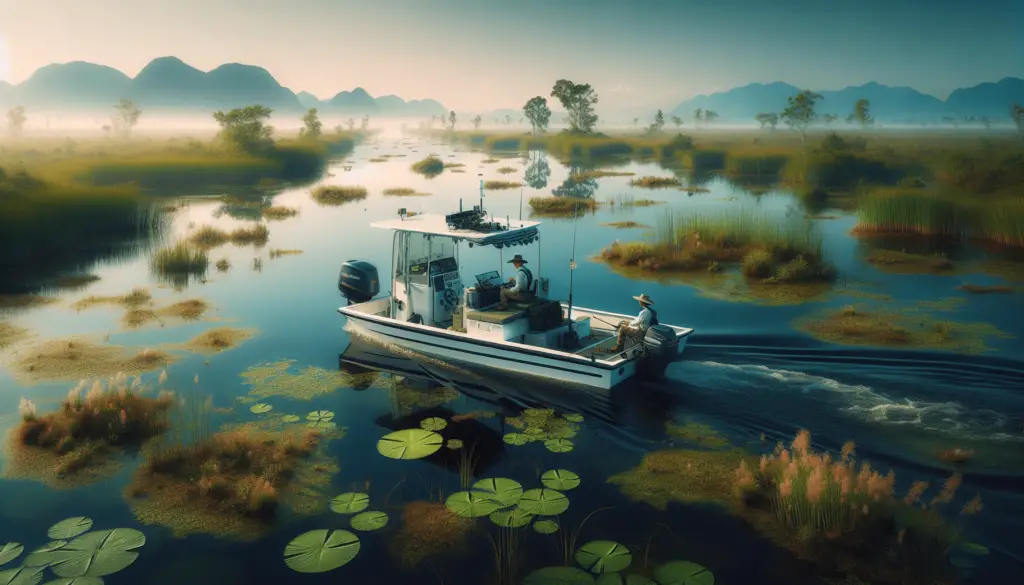Imagine yourself cruising on a serene waterway, surrounded by lush vegetation and a symphony of birds singing—the picturesque wetlands. You may not realize it, but your boating habits play a crucial role in conserving these essential ecosystems. In the following article, “The Role of Boating in Wetland Conservation,” you’ll discover how conscientious boating provides a pathway to safeguard these vital habitats. Understand the correlation between your love for boating and the health of our planet’s wetlands, while learning crucial tips to become an advocate for their preservation.

Understanding Wetland Conservation
Hey there! Today, we’re going to talk about something that is close to my heart – wetland conservation. Now, you might be thinking that wetlands are just soggy bits of land, but they’re so much more than that! Wetlands are vibrant and dynamic systems that are critical for the health of our planet.
The Importance of Wetland Conservation
Wetland conservation is no small matter, you know. Wetlands are like the kidneys of our planet. They clean and purify water, reducing water pollution by trapping sediments and absorbing pollutants. Wetlands also provide crucial habitat for all sorts of wildlife, some of which can’t survive anywhere else. And let’s not forget, they’re often our frontline defense against flooding as they absorb excess rainfall and slow its spread. So, basically, keeping our wetlands healthy is keeping our planet healthy.
Types of Wetlands
Did you know there are different types of wetlands? Yes, indeed! You have marshes, those are the wetlands filled with reeds and grasses. You’ve also got swamps, which are forested wetlands. And then there are bogs, filled with mosses and home to carnivorous plants. Don’t forget about fens, they’re like bogs but they’re fed by groundwater.
Threats Faced by Wetlands
Unfortunately, wetlands are up against some heavy hitters. Climate change, land development, pollution, and invasive species all threaten the health and sustainability of these crucial ecosystems. Over the last century, we’ve lost around 64-71% of our wetlands, a staggering figure that highlights how pressing this issue really is!
The Influence of Boating on Wetlands
Boating might seem like a fairly benign activity, but it can have significant impacts on wetlands.
Effects of Boating on Wildlife
Wildlife, for one, can be seriously disturbed by boating activities. The noise and disturbance could disrupt their feeding and nesting routines, and even drive them out of their habitats.
Pollution Caused by Boating
Pollution is another issue. Boats can leak fuel and oil into the water, and improperly disposed waste can end up polluting the wetland environment.
Erosion Due to Boating Activities
Boating activities can also cause erosion, particularly in areas with heavy boat traffic. Regular boat use can damage vegetation and stir up sediment, both of which harm the overall health of the wetland.
Healthy Practices in Boating
So, what can we do about it? Plenty!
Responsible Boating
First off, we can be more responsible boaters. Stick to established waterways, avoid sensitive areas during key wildlife seasons, and always properly dispose of your waste.
Awareness and Education on Wetland Conservation for Boat Users
Awareness and education can go a long way too. The more we know about wetlands, the more we can do to protect them. Information about local regulations, sensitive species, and best practices for boating can all help in reducing our impact.
Laws and Regulations on Boating
Local laws and regulations also have a key role to play here. They can limit destructive practices and ensure that boating activities have minimal impacts on these fragile ecosystems.
Direct Ways Boating Can Help in Wetland Conservation
But boating doesn’t just have to be the problem, it can also be part of the solution!
Cleaning Debris While Boating
Just imagine yourself, out on the water, picking up trash while you go. Sounds fulfilling, right? Not only are you enjoying your time out in the water, but you’re also helping to keep the wetland clean and healthy.
Boat-Based Research and Monitoring
Boats can also be crucial for research and monitoring efforts. They allow scientists to access hard-to-reach areas and gather important data about wetland health and wildlife populations.
Promoting Responsible Eco-Tourism via Boating
And then there’s eco-tourism. Boating can be an excellent way to showcase the beauty, importance, and fragility of wetlands. By offering responsible eco-tourism options, we can help raise awareness and appreciation for these ecosystems.

The Role of Boat-based Education Programs in Conservation
Education is the key to change, right? Well, believe it or not, boating can be an excellent platform for education.
Teaching About Wetland Ecosystems
From a boat, we can see firsthand the marvelous diversity and complexity of wetland ecosystems. This makes for memorable and impactful lessons about the importance of conservation.
Training Courses on Wetland Conservation
Training courses can also be held on boats. These can equip participants with valuable knowledge and skills on wetland conservation, monitoring techniques, and responsible boating practices.
Public Awareness Programs
Boats can even be used for public awareness programs. By engaging local communities through boat tours and hands-on conservation activities, we can foster a deeper appreciation for wetlands.
The Link Between Boating and Fishery Conservation
When you think of boating, you might also think of fishing. What if I told you that fishing can also contribute to wetland conservation?
Sustainable Fishing Practices
Sustainable fishing practices can help protect wetland species and systems. Regulations like size and harvest limits, seasonal closures, and gear restrictions can all aid in conservation efforts.
Research Opportunities in Fisheries
Boat-based fishery research also presents opportunities for valuable data collection and monitoring. This can inform sustainable fishing practices and strategies for wetland conservation.
Boat-Based Fishing Regulations
And of course, let’s not forget about regulations. Fishery regulations can be designed to minimize impacts on wetland systems and species.
Case Studies of Successful Boating and Conservation Collaborations
There’s no use talking about all this without some examples, right?
Successful Conservation Efforts Using Boating
Across the globe, we can find examples of successful conservation efforts that have incorporated boating. These initiatives have used boats for everything from monitoring and research to education and eco-tourism.
Challenges Faced and Overcome
But it’s not all smooth sailing (pun intended!). There have been challenges along the way – limited resources, lack of awareness, and sometimes even pushback from local communities or industries. What shines through, however, is that with teamwork and commitment, these challenges can be overcome.
Lessons Learned from Case Studies
Each successful collaboration provides lessons for the rest of us. The importance of community involvement, the need for adequate resources, and the power of education all shine through.
The Sociocultural Impact of Boating on Wetland Conservation
Conservation isn’t just about wildlife and wetlands, it’s about people too.
The Influence of Local Communities
Local communities can play a critical role in conservation efforts. From participating in clean-up drives to monitoring local ecosystems, communities have the potential to make a big difference.
Respecting Indigenous Rights and Practices
It’s also vital to respect and acknowledge indigenous rights and practices. Traditional knowledge and cultural practices can add invaluable insight to conservation strategies.
Community-Run Conservation Projects
Community-run projects can be incredibly effective. These initiatives ensure that conservation efforts are locally driven and sustainable.
The Economic Impact of Boating on Wetland Conservation
The economy and environment are more connected than you might think!
Economic Benefits from Sustainable Boating
Sustainable boating can have all sorts of economic benefits. Whether through eco-tourism, fishing, or other boat-based activities, sustainable boating can create jobs and bring money into local economies.
The Cost of Wetland Restoration
Of course, wetland restoration and conservation does come with a cost. However, in many cases, these costs are heavily outweighed by the economic and environmental benefits of a healthy wetland.
Supporting Local Economies through Responsible Boating
Supporting local economies is another huge part of this puzzle. Whether it’s by employing local guides, buying local gear, or supporting local conservation projects, responsible boating can have a significant positive impact.
Future Directions for Boating and Wetland Conservation
So, where do we go from here?
Technological Innovations in Boating for Conservation
Technology can play a big role in tackling some of these challenges. From cleaner engines and waste systems to high-tech monitoring equipment, there are plenty of opportunities for innovation.
Proposed Policies and Regulations
Policy and regulation will also be key players in shaping the future of boating and wetland conservation. New policies should aim to balance the enjoyment and use of wetlands with their long-term conservation.
Strengthening Global Partnerships and Collaborations
Lastly, we need to strengthen global partnerships and collaborations. No one can tackle these challenges alone. Only through connecting different stakeholders – from local communities and researchers to industries and policymakers – can we hope to make a real and lasting difference.
That’s it from me for today! I hope this gives you a better understanding of how boating can impact and, more importantly, contribute to wetland conservation. Here’s to protecting and enjoying our beautiful wetlands one boat ride at a time!

